- Home
- Brian Garfield
Villiers Touch Page 4
Villiers Touch Read online
Page 4
At this hour a taxi would be hopeless. He walked. It took the better part of half an hour, at a brisk pace, to walk north past St. Paul’s and City Hall to the new Federal Plaza at Foley Square.
The Commission’s New York staff of one hundred and fifty people took up a good part of Quint’s floor. Hastings went by Quint’s door without pausing—Trading & Exchange Division, Chief of Investigations—and went straight into his own small brown-carpeted cubicle. Miss Sprague gave him a bony reserved smile; she was talking into a telephone. Hastings went around behind his desk and sat. It was a pedestal desk, its side wing open with dictaphone and adding machine. He couldn’t see Miss Sprague until she hung up the phone and came around the partition with her notebook.
She said, “I put those papers for you to sign on your desk.”
“Thanks.” He glanced through them and spoke while he signed his name. “A couple of things. Call Hackman and Greene, the brokers, and get the address and phone number of one of their clients, a Miss Carol McCloud. Then see if you can reach her by phone and set up an appointment for me to see her today or tomorrow. Tell her it’s about some stock she owns. Oh, and before you do that, see if you can get Bill Burgess of Justice on the phone for me.”
Miss Sprague acknowledged the instructions with a one-inch nod and retreated, exuding all the sensuality of an ironing board. Hastings finished signing the documents. By the time he was done, the intercom had buzzed.
“I have the Justice Department for you. Mr. Burgess.”
“Thanks.” He picked up the phone. “Bill?”
“Hiya, Russ, howsa boy?” Burgess had a rumpled-seersucker voice, amiable and cheery. He was a hearty, clean-cut, perennial collegiate. “How’s bachelorhood treating you?”
“Kind of dull,” Hastings said, wry.
“You miss the flying pots and pans, hey? Listen, I don’t think I’ve seen you since Jim Speed died. When we going to get together? I still have the boys around to the poker game every Wednesday night—how about it?”
“I’ll try to make it sometime soon,” Hastings said. “Listen, an item for your IBM brain. Does the name Salvatore Senna punch out one of your computer cards?”
“Not offhand. Should it?”
“Beats me. It belongs to an investor in Montreal.”
“Montreal, huh?”
“Exactly. I thought it might be one of your expatriate mobsters. But nothing lights up, eh?”
“I’m sorry, Russ. Want me to run it through R and I for a check?”
“It’s probably not worth it. If the name doesn’t strike a chord in that memory of yours, it’s probably clean. Maybe I haven’t been sufficiently educated by the Italian Anti-Defamation League.”
“No doubt. Anything else on your mind? How do you like the job up there?”
“Too soon to tell. If I could get my teeth into something, it might be all right.”
“You sound jaded, Russ.”
“Maybe I am. I’ll see you sometime.” He rang off and sat back, drummed his fingers on the edge of the desk, frowned, and wondered if he wasn’t jumping at illusions. In the old days, with Speed, he had produced large results by following nebulous hunches; but maybe Quint had been right: this was finance, not politics, and perhaps he wasn’t yet sensitive enough to the clues and signs. In this arena one needed a good deal more than hunches and suspicions; the evidence of malfeasance had to be ironclad and substantial. Otherwise there was no point in opening a case. The government, even with the best evidence, was loath to prosecute securities cases; to a juror, the details were as baffling as hieroglyphics; to get a conviction was to achieve a miracle.
Prosecute a case … jurors … conviction. His chuckle, uttered aloud, was a wry snort. He didn’t have so much as a clear-cut suspicion. Only the vaguest intimation. But he had told Quint there were vibrations: he had felt them. Something was in the air. He felt vague stirrings, the disquiet of anticipated excitement, and he didn’t want to bring himself down by reminding himself that perhaps he was only sensing what he wanted to sense: he wanted the hunt, the chase. I feel like a fight. So help me, I feel like a fight.
3. Diane Hastings
In the dirty narrow gorge of Madison Avenue a yellow taxi made its way to the curb to discharge its passenger, who emerged with a trim stretch of long legs and drew male stares when she walked across the curb into a tall, checkered-glass slab of a building.
She took the express elevator to the thirty-third floor and stepped out into the deep-carpeted reception foyer of Nuart Galleries International, answered in kind the pretty receptionist’s grin, and went along a hall until she stopped outside the open door of the stockroom.
The place was a frenetic mess, a welter of prints and paintings. Matted reproductions stood against every available inch of wall. Cynthia MacNee was striding back and forth with impatient disgust. “Shit. Hello, Diane dear.”
Diane Hastings stepped carefully over a litter of catalogs, chic and slim as a fashion model, with the long-boned slender-ness that photographers loved as a clothes hanger. She used it herself for that purpose, today wearing a severe, classic Givenchy.
Cynthia flung herself around the room with big-limbed abandon; she gave Diane a rushed and furious glance and said, “God damn it, it’s all crap.”
Diane Hastings surveyed it. “How can you possibly tell, in this clutter? Where did that Mandering come from?”
“I wanted to have a look at it. We might be able to get the repro rights for a few thousand. It’s the one what’s-her-name auctioned off upside down at Parke-Bernet.”
“Not bad,” Diane said.
Cynthia stopped, stared at her, and uttered a horsey snort. “Not bad? My dear, you see before you examples of dismal taste from every period in the history of civilization. I ask you—look at that moth-eaten Scott Taylor. That vertiginous Mosarely.” She struck a pose. “Aht for the masses at pop-yew-lah prices! Madness, don’t you know? Yah gets what yah pays for, honey, and this pile of horse shit only proves once again that you can’t make a silk purse out of a two-dollar whore.”
Diane laughed, picking a path across the room to her office door. “Better get it cleaned up before their majesties the out-of-town buyers arrive tomorrow.”
“I’ll dump it all down the incinerator chute,” Cynthia said in her drawling, throaty voice. “Just see if I won’t!” She made a Girl Scout’s honor sign. Diane laughed again and shook her head, staring with amused wonder at the huge girl in transparent boots, lacy patterned stockings, a miniskirt, a little vinyl jacket, and a derby hat. Cynthia recognized her expression and crinkled her nose with fierce defiance. “Somebody around here has got to look the part of the artsy-craftsy kook. Who’d buy modern art from anybody who looks as sane as you?”
Diane went into her private office, leaving the door open behind her. It was a big room with deep carpet, push-botton phones, big-window views of the downtown skyline and a patch of the East River. The furnishings were in walnut, gold, and beige; there was a long couch with a coffee table, a wide expanse of beige carpet, and set across the corner, the desk. Its opulence and size were part of the boss-lady image which, at rare moments, amused her. She had not got used to the idea—after five years she probably never would—and she still felt she lacked the hard brass that seemed common to all the bitch-on-wheels female executives she knew.
She settled into her chair and buzzed the secretary: “Any messages, Maude?”
“A Mr. Villiers called this morning. He said he wasn’t sure where he’d be and said he’d call you back.”
Diane took a deep breath. “Thanks. Anything else?”
“A call from the manager of the Seattle store wanting to know what had happened to his shipment of Thanksgiving greeting cards. I switched him to Mr. Winslow in Distributing. He sounded kind of sore—I guess the computer loused up his order.”
“That damned computer,” Diane said. “That all?”
“Yes. You have a luncheon appointment at one-thirty.”
“I know. I’ll be in the office till then, if there are any calls.”
She switched off the intercom and thought of Mason Villiers, constructing a picture of him—dark, tautly attractive, glittering with hard ambition and thoroughly masculine charm. She hadn’t seen him in months. She had met him just after her divorce, and there had been a few dates; she had been afraid of what the wags called the Rebound, and she had not allowed anything to come of it. He had wanted to seduce her; he was a man to whom conquest came easily. But she had told herself, I won’t be a pushover. She had evaded him, and he seemed to have taken the hint. Now he was back. Why?
She played with a pencil, speculating, a walnut-haired woman with skin pulled taut across the good high bones, the sweep of her eyebrows emphasized in pencil. She knew she was beautiful, not with the padded softness of early youth, but with the pared-down bone beauty of thirtyish maturity. She had seen few men since the divorce, and those few only casually; she had plunged deep into her work. She didn’t want to admit she was afraid of herself in a man’s company, but she couldn’t forget the things Russ had said to her. She wanted very desperately not to believe him: “It’s got to the point where you’re doling out warmth by the teaspoonful.” Words blurted in the anger of the moment, admittedly—but sometimes when she glimpsed herself in the mirror, she thought the eyes were a bit too cool, a bit glittering.
Her friends in art and business claimed to envy her; with awe they assured her she had reached the exalted nirvana of the parlor psychologist: she was well adjusted. But adjusted to what?
The result of a collapsed marriage was always self-pity. She had seen it often enough in others. It was, she knew, time to come out of the self-imposed period of mourning. She began to look forward to Mason Villiers’ call.
Cynthia MacNee came batting into the office like a clumsy brunette sheepdog. It was always a surprise to view that pretty, shield-shaped face atop the ungainly hugeness of her. She wasn’t unattractive; were it not for her horsey way of moving and the absurdity of her costumes, she might have been regarded as statuesque and lovely. She had to be in constant social motion, or she would perish; her overwhelming energy and furious bounce were awe-inspiring. She said loudly, with her customary twinkling urbanity, “I know a lot about art, but I know what I like, and this season’s horse shit isn’t either one.”
“Stop being silly. It isn’t all that bad. In fact, quite a few of them are good.”
“You’re a Philistine. I’m the buyer around here, I’m supposed to be the expert on art, and I say that stuff would be a swindle if you peddled it at three-ninety-eight a yard. My deah, a painting is supposed to capture a feeling that will rouse you when you look at it. Even revulsion will do. But these are just nyeh.” Cynthia threw up her arms and wailed, “Where oh where are the promising young geniuses of yesteryear? I’d like to sue them all for breach of promise!”
“Wherever they are,” Diane answered mildly, “they’re not offering paintings to us for thirty dollars per original oil. I’m sorry these are beneath you, but let’s not forget we have fourteen offices down that corridor occupied by men and women who get paid to supply paintings and whatnot to sixty-one galleries. You’re welcome to junk the whole lot if you like, but you’ve got just two weeks left to replace it.”
Cynthia blinked and scowled. “Quit sounding like a shop foreman. Where’s your barefoot dash?”
It made Diane look away in discomfort. “I’m sorry. Was I being hard-boiled again?”
“A little. Honey, don’t you recognize the symptoms when I start to bitch and moan like this? It’s only frustration because they haven’t invited me to be acquisitions chief at the Met. With my background, in this crass job of yours I’m slumming.”
“And getting paid twice what you’d get at the Met.”
“See what I mean?” Cynthia demanded. “Crass!”
Diane poked her pencil toward the big girl. “I see it now. The real trouble is, you’ve broken up with the latest boyfriend.”
“Curses! Foiled again!” Cynthia cried. “Am I that transparent? You sting me to the quick!”
“It happens every other week.” Diane smiled with half her mouth. “I’m beginning to recognize the signs. Who was it this time, young Ted Raine?”
“How did you know?”
“You’ve bought too many God-awful paintings of his.”
Cynthia’s face fell. “I’m sorry. I didn’t mean to—I usually don’t let that kind of thing interfere with my judgment. It won’t happen again—were they really God-awful?”
“Pretty bad. How’d you manage to get rid of him? Insult his mother?”
“No, that was the last one.” A crafty gleam came into Cynthia’s eye. “At a really passionate moment, I called him Phyllis.” She winked elaborately and exploded in barking laughter that doubled her over.
Diane shook her head in ironic disbelief. “Only you could have thought that one up. He must have left at full gallop.”
“He almost forgot his pants,” Cynthia gasped through her tears. She straightened up, gave a few post-paroxysm snorts of subsiding laughter, and dragged a vinyl sleeve across her eyes. She added weakly, “You should’ve seen his stricken face.”
“Why do you do it?”
“Oh, hell, honey, they make me want to puke when they get so damned serious and intense. I can’t help it, it just comes out. Sex is supposed to be fun.”
Diane put the pencil down. “Easy to say. Not all of us can be so carefree about it.”
“Hah!” Cynthia roared, and composed her face to snarl in her Humphrey Bogart rasp, “Now you liften here, fweetheart, ya gotta think of yourfelf af a fwinger, fee?” She came to the front of the desk and braced both long arms against it, leaned forward, and peered close. “What good does it do to make a ladies’ magazine heroine out of yourself, all the time waiting for love? Shit, there are all kinds of things you can get along without if you have to—arms, legs, eyesight. Lots of people do. Love. Okay, forget it—you just take stock of what you’ve got left, and you convince yourself it’s just as important, and maybe a whole lot more fun. I wasn’t kidding just now—it’s a hell of a lot easier to tolerate yourself if you think of yourself as a swinger instead of using a loaded word like ‘promiscuous.’ Why lock yourself up in a chastity belt? Think of what you’re missing out on.” She straightened and lunged around the room, talking with big swings of her arms. “Do I sound like some old Lana Turner movie on the late show? Hell, put it down to my stunted intellect—I started smoking when I was fourteen. But it makes me a little sad to see you locking yourself up, and I hate things that make me sad. It’s a swinging world, honey—there aren’t any hellfire-brimstone Calvinists around here to punish a girl for going out and getting laid when she feels like it. Why do it yourself with leg irons and twenty lashes of Freudian guilt?”
“You make it sound simple.”
“Do I? That’s the disadvantaged child in me. I make profound truths sound like comic-book clichés. Now, if I had your breeding, I could make even the most nonsensical small talk sound distinguished—think what I could do with the Great Truths! Christ, I’d hang out a shingle and put a couch in my office and charge two hundred dollars an hour!”
The intercom buzzed. Diane flicked a switch, and the secretary’s voice came through: “I’m going out to lunch now, Mrs. Hastings. Shall I switch incoming calls to your phone?”
“Yes, thank you, Maude.”
The intercom clicked; Cynthia said immediately, “You ought to tell her to quit calling you Mrs. Hastings.”
“Oh, I’m still Mrs. Hastings to the trade—it would be too confusing to change my name back now.”
Cynthia stopped patrolling; she stopped with her shoulder blades against the wall, folded her arms, and said, “Come off it, dahling. That’s not the real reason.”
“If you’re suggesting I’m still—”
“In love with Russ? No; even I am not that cornball. What I’m suggesting is that you give yourself a kind of untoucha
ble immunity as long as you keep that ‘Mrs.’ in front of your name. And I don’t think it’s healthy.”
“Don’t be ridiculous. I simply don’t want to resume my maiden name, because I’ve always been too proud to trade on my father’s name. Really, Cynthia, sometimes I wish you’d quit jumping to conclusions.”
“Are you sure that’s what I’m doing? Look, if what you say is true, why not keep the ‘Hastings’ but change the ‘Mrs.’ to ‘Miss’?”
“Because it just isn’t done.”
“Oh! A thousand pardons, memsahib!” Cynthia bowed elaborately from the waist. “You must forgive my gauche ignorance. I have lousy table manners too.”
“The result of your disadvantaged childhood, no doubt.”
Cynthia grinned. “Okay. Touché. But if you can be defensive about sex, I can be defensive about my po’-white-trash background. Let’s be fair about it.”
Diane made a face and reached for the stack of correspondence in her In tray, indicating that so far as she was concerned, the conversation was ended. But Cynthia said stubbornly, “Have you met Emiliano Upton?”
“No. Why?”
“Know who he is?”
“He paints, doesn’t he?”
“You could call it that. He used to paint enormous canvases of, ah, human sexual organs—in exquisitely enlarged detail. A real howl, but it didn’t find much of a market outside of a few rich voyeurs. Your ordinary dimestore-art buyer would hardly hang one on his living-room wall. I persuaded him to try something a bit more genteel, and I’m going down next week to see the results. He’s a big sumbitch, really hung—I think maybe I’ll fix you up with him for openers.” Cynthia grinned furiously.
“When I want a matchmaker,” Diane snapped, “I’ll let you—”
The phone rang, cutting her off. She punched the blinking button and lifted the receiver. “Mrs. Hastings.”
A man’s voice laughed. “Answering your own phone now? Have they knocked you down that far?”

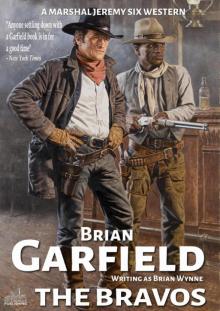 Marshal Jeremy Six #3
Marshal Jeremy Six #3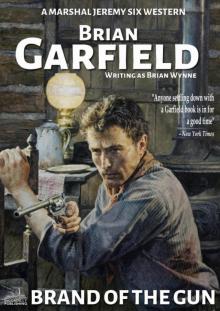 Marshal Jeremy Six #6
Marshal Jeremy Six #6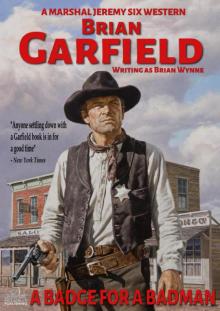 Marshal Jeremy Six #5
Marshal Jeremy Six #5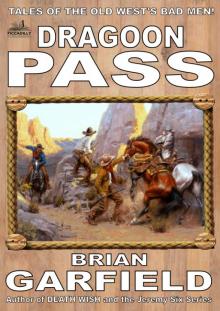 The Outlaws 2
The Outlaws 2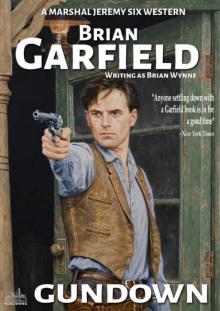 Marshal Jeremy Six #7
Marshal Jeremy Six #7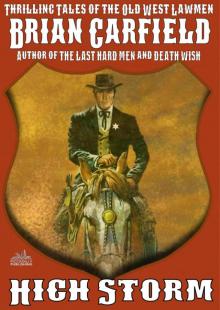 The Lawbringers 4
The Lawbringers 4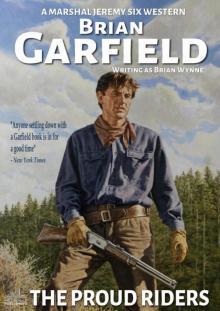 Marshal Jeremy Six #4 the Proud Riders
Marshal Jeremy Six #4 the Proud Riders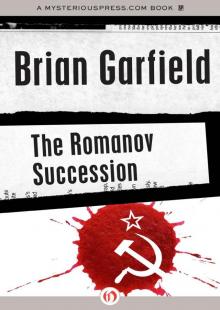 The Romanov succession
The Romanov succession Marshal Jeremy Six #8
Marshal Jeremy Six #8 Sliphammer
Sliphammer Line of Succession
Line of Succession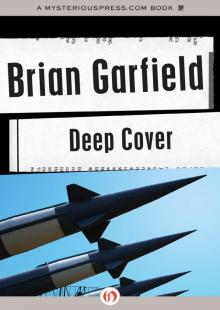 Deep Cover
Deep Cover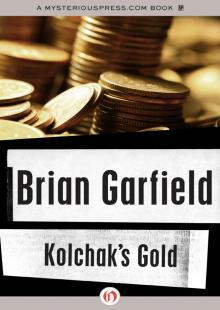 Kolchak's Gold
Kolchak's Gold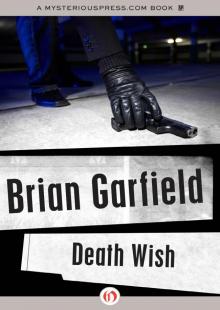 Death Wish
Death Wish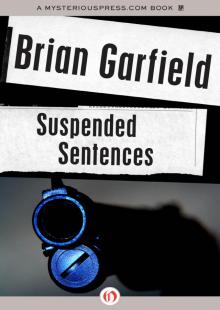 Suspended Sentences
Suspended Sentences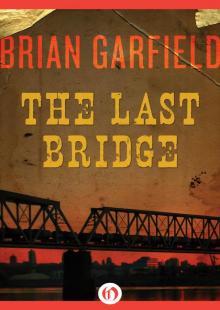 The Last Bridge
The Last Bridge Relentless
Relentless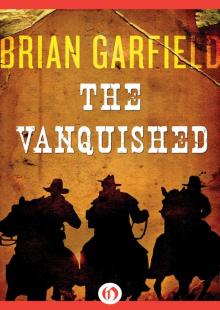 The Vanquished
The Vanquished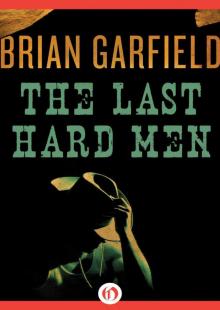 The Last Hard Men
The Last Hard Men Hit and The Marksman
Hit and The Marksman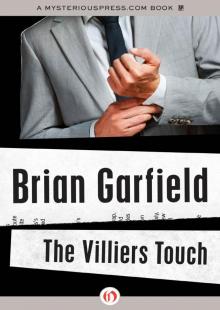 Villiers Touch
Villiers Touch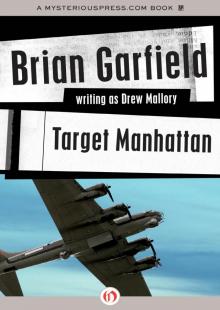 Target Manhattan
Target Manhattan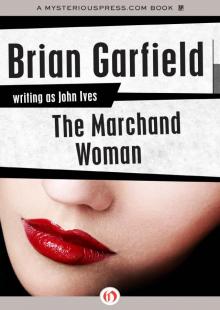 Marchand Woman
Marchand Woman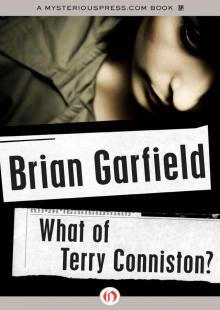 What of Terry Conniston?
What of Terry Conniston?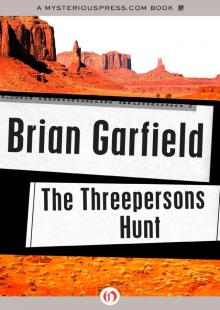 Threepersons Hunt
Threepersons Hunt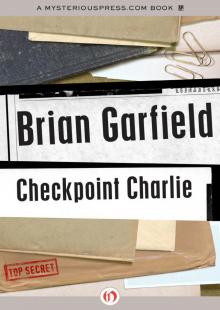 Checkpoint Charlie
Checkpoint Charlie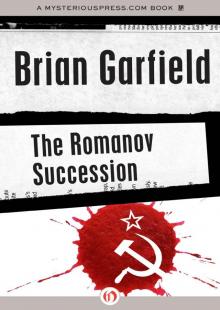 Romanov Succession
Romanov Succession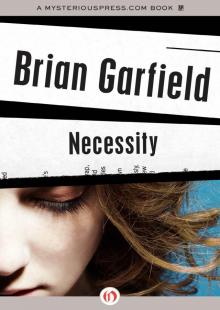 Necessity
Necessity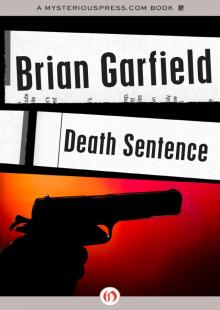 Death Sentence
Death Sentence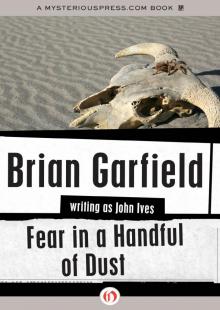 Fear in a Handful of Dust
Fear in a Handful of Dust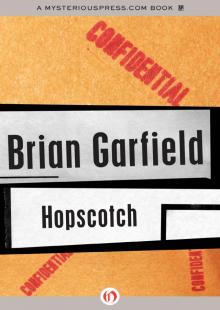 Hopscotch
Hopscotch